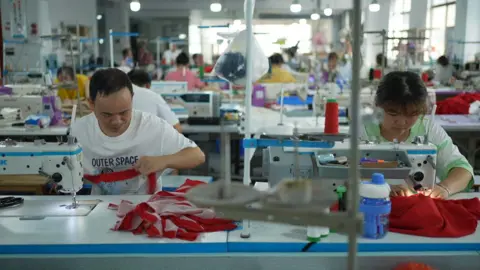U.S. President Donald Trump gestures during the annual Friends of Ireland luncheon, hosted by U.S. House Speaker Mike Johnson (R-LA) at the Capitol in Washington, D.C., on March 12, 2025.
Evelyn Hockstein | Reuters
On Wednesday, U.S. President Donald Trump warned that he would retaliate against Europe’s response to the new 25% tariffs imposed on steel and aluminum imports from the U.S.
As these tariffs took effect, the European Union (EU) declared plans to impose counter-tariffs on U.S. products valued at 26 billion euros ($28.33 billion), effective in April.
In response, Trump indicated that he would implement additional tariffs, stating to reporters that the White House would engage in “reciprocal tariffs,” asserting, “Whatever they charge us, we’re charging them. Nobody can complain about that.”
When asked about his plans to reciprocate, Trump replied, alongside Ireland’s Prime Minister Micheál Martin, “Of course I’m going to respond.”
“The issue is our country didn’t respond [in the past],” he added, reiterating his view that the EU was “set up to take advantage of the United States”—a notion that contradicts the EU’s goal of promoting regional interests.
When questioned if Ireland was similarly benefiting from the U.S., Trump stated “of course they are,” lamenting the U.S. “massive [trade] deficit” with Ireland, attributing it to the nation’s low corporate tax rates.
Recent statistics from Ireland’s Central Statistics Office reveal that the trade surplus between Ireland and the U.S. reached 31 billion euros in 2023.
U.S. President Donald Trump meets with Irish Taoiseach (Prime Minister) Micheál Martin in the Oval Office at the White House in Washington, D.C., on March 12, 2025.
Evelyn Hockstein | Reuters
Trade disparities are among Trump’s principal concerns with various international trading partners. Although he has previously imposed tariffs on Mexico, China, and Canada in his second term, the EU has not yet faced such duties.
The EU remains a target for Trump, who has suggested imposing 25% tariffs and criticized the bloc for its trade discrepancies with the U.S.
Information from the European Commission indicates that the EU recorded a trade surplus of 155.8 billion euros with the U.S. for goods in 2023, while experiencing a 104 billion euro deficit in services. Overall, EU-U.S. trade in goods and services totaled 1.6 trillion euros in 2023, according to the EU.
The largest portion of EU exports to the U.S. consists of machinery and vehicles, followed by chemicals, manufactured goods, as well as medicinal and pharmaceutical items.
Tensions between Washington and Brussels have been escalating since Trump took office in January, when he swiftly indicated intentions to impose tariffs on the EU.
“They’ve really taken advantage of us,” Trump remarked during a Cabinet meeting on February 26, adding: “They don’t accept our cars, they don’t essentially accept our agricultural products. They have numerous reasons for this. Meanwhile, we accept everything they offer.”
After enforcing the 25% tariffs on steel and aluminum on Wednesday, which the EU estimates will impact up to 26 billion euros of its exports to the U.S., European Commission President Ursula von der Leyen stated that the EU “must act to protect businesses and consumers.”
“We deeply regret this measure [from the U.S.]. Tariffs are essentially taxes, which are detrimental to businesses and even more so for consumers. They disturb supply chains, create economic uncertainty, threaten jobs, raise prices, and neither side benefits from this,” she communicated during a press conference.
According to von der Leyen, trade relations between the U.S. and EU “are the largest in the world,” having previously fostered “prosperity and stability for millions” and led to job creation on both sides of the Atlantic.
The EU’s strategy involves reinstating previously suspended tariffs on 8 billion euros worth of U.S. exports alongside implementing new countermeasures on 18 billion euros of goods—a move von der Leyen described as “strong but proportionate.”
“We will remain open to negotiation,” she concluded in a statement.










 Bengali (Bangladesh) ·
Bengali (Bangladesh) ·  English (United States) ·
English (United States) ·